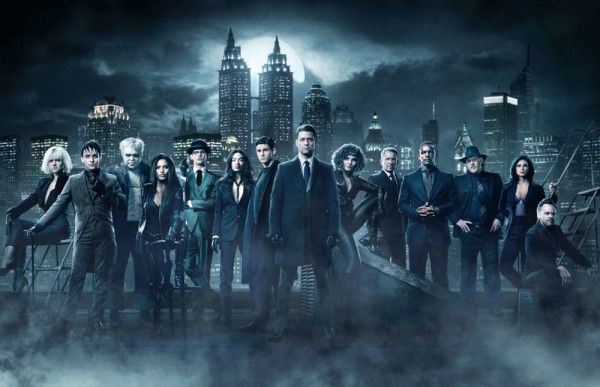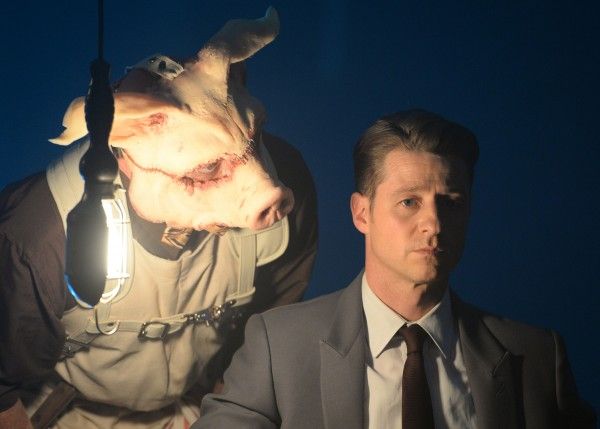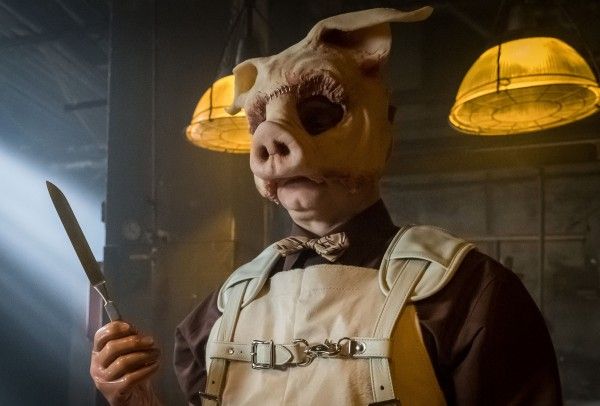From the moment of his debut on the Fox series Gotham, Professor Pyg (played with unnerving brilliance by Michael Cerveris) had most definitely made an impression. As a serial killer assassinating cops and dressing his victims in the severed heads of pigs while also wearing a pig’s head himself, Pyg is terrifying and disturbed, but also clearly the mastermind of his own twisted plan that involves Jim Gordon (Ben McKenzie), whether he likes it or not.
During this 1-on-1 interview with Collider, actor Michael Cerveris (who also played September on Fringe and Ramses IV in The Tick) talked about the fun of taking on a character like Professor Pyg, the evolution of the pig mask, Pyg’s overall plan, acting behind the pig face, why Pyg feels so connected to Jim Gordon, the confrontation to come with Penguin (Robin Lord Taylor), and why Pyg sees himself as the hero (you can also check out a red-band trailer for the upcoming episode here). He also talked about being a part of the Steven Soderbergh HBO series Mosaic and its unusual new storytelling approach.
Collider: It’s been a real pleasure to watch you on Gotham as Professor Pyg because he’s just such an interesting character.
MICHAEL CERVERIS: You absolutely feel, when you enter into this world, that the bar is pretty high. I’m grateful that everybody seems to have taken up the challenge, in the most dramatic, fun and exciting ways, with this character. I was aware that there is a big section of the comic book fan base that really had been wondering if Professor Pyg would ever show up on Gotham and were excited about the chance that he might, but then that also makes you more nervous that you’re going to live up to people’s expectations.
I don’t personally have a fear of clowns, but masks bother me, and I have to say that this pig head with the floppy ears definitely bothers me.
CERVERIS: Weirdly, that’s the thing that is most unnerving. The early drafts of the mask were more like the comic book, which was a more cartoonish sort of thing, and Danny Cannon, the executive producer, said, “No, I want it to look like he cut a pig’s head off and put it on his face.” When they went in that direction, there was just something about all of that grisly gruesomeness, and then these weird little vibrating ears that’s hilarious and terrifying, at the same time.
You’ve auditioned for a few roles on Gotham, over the seasons, even going all the way back to auditioning for Alfred for the pilot. What kept drawing you back to this show, and would you have kept coming back, if Professor Pyg hadn’t been in the cards for you?
CERVERIS: Sure! I just have been a fan of the show. It’s one of the most stylish and inventive shows that’s out there, certainly on network television. I grew up as a comic book kid, so the idea of having a chance to be a part of the DC Universe and the Gotham storyline, in particular, would have been exciting and appealing to me, anytime that it happened. And then, the fact that I’ve been such good friends with Danny Cannon for so many years, I would always want to be a part of something that he was involved with because I know that it will be high quality and fun. So, yeah, I would have kept coming back, no matter what, but I really do feel like this is an example of the right thing finding you at the right time.
You certainly made quite the entrance and quite the impression, as Professor Pyg. He’s not a guy who flies under the radar. How long do you think he’s been planning all of this, and why was now the right time for him to make himself known?
CERVERIS: Part of the answer to that is going to be revealed in upcoming episodes. It’s clear that there’s a deep and painful history for him in Gotham. There was that line in the first episode, “Hog Day Afternoon,” where he says, “I’ve suffered greatly at the hands of the Gotham elites,” or something like that, so you know that he’s had a troubled past, as far as the city, the people and Gotham. Why it’s happening right now, I think is a combination of opportunity and access that comes his way, as we will learn in the next few weeks.
What’s it like to have to act behind the pig face?
CERVERIS: It’s strangely liberating to work behind a mask like that. There’s a whole school of mask work from this famous teacher in France, and part of the idea is that, with your features disguised, it strangely allows you to be more free and less self-conscious because you’re kind of hidden. I discovered that when I was doing Hedwig in New York, London and L.A. That huge drag persona and the make-up and wigs, and everything, also gives you this weirdly protective shell that allows you to be even freer and more inventive. So, the pig mask is great for that. It is true that it’s hard to do the Professor Pyg voice and the gestures, and everything else, when my face is exposed. In upcoming episodes, you’ll see the mask on and the mask off, and all kinds of versions in between. It does provide some practical problems, like seeing the floor and hitting my mark. That becomes a little difficult because I have no peripheral vision from my nose down, but it could be a lot worse. The back of it is open because of the way that it’s strapped on my head, so it’s not as hot as it might be. It’s heavy, but it’s not incredibly heavy. It’s all counter-balanced on the front of my head, so it wants to pull my head down. I spend the day with my neck muscles straining to keep my head upright. I was surprised that they did a lot of work to make it so that my mouth was free and visible. Partly, they wanted to be able to see somewhat of a human being in he mask, so they worked on the sides of the eye holes and how to cut it to still see my chin and my mouth. That does make it possible for me to talk more easily than if it were covering my mouth, too. It also helps the sound department not have to have me loop all of my dialogue because they can get it live. It sounds a little odd, but that’s what it sounds like to people who are listening to me live in the studio, too.
If you were to strip away the mask and the disguises, does Pyg know who he is without all of the showmanship, and is he as comfortable with himself, totally stripped down, as he is when he’s Pyg?
CERVERIS: He definitely does know who he is. I don’t know that he’s so comfortable with who he is. That’s another thing that’s going to reveal itself, in the weeks ahead. The layers do continue to get stripped down, at times, and then reapplied with a vengeance, at other times. There’s definitely a past and an original self that he doesn’t want anybody to know, doesn’t want anybody to know about, and doesn’t want to acknowledge, if he doesn’t have to.
It’s almost as though Pyg sees himself and Gordon as a team, of sorts, and that he’s just waiting for Gordon to get on board with that.
CERVERIS: It’s that relationship that only one of the people knows about.
How upset will Pyg be, if Gordon doesn’t come around to Pyg’s plan, in the way that Pyg would like?
CERVERIS: At the moment, he’s not even allowing for the possibility that that could ever happen. At the moment, he’s so convinced that, even though it may take longer than he had hoped, he knows that Jim Gordon is his parallel and his partner. If Jim doesn’t realize it yet, the Professor is patient and knows that with time and with carnage, he’ll be able to bring Jim around.
We know that obviously Pyg and Penguin are on a collision course with each other, which can’t end well.
CERVERIS: Maybe it’s a species thing.
What can you say about that confrontation?
CERVERIS: Just on a personal level, the scenes that I’ve gotten to play with the actors on the show are as much of a reward as anything else. Getting to play that scene in the ambulance, with Professor Pyg disguised yet again, with Ben [McKenzie], and that first scene where he captures him, was so exciting. It was so great to do that kind of face-to-face emotional scene, and getting to do that with Ben was a real thrill and joy. And then, his encounters with Penguin, in the form of Robin [Lord Taylor] or a whole other thing. All of the dials are turned up, well passed eleven, when the two of them come face-to-face. That is so fun, as an actor, to get to throw the gloves off and see who can out operatic the other one, in those scenes. On a storytelling and character level, that is what the fun of Gotham is. It will go beyond the safer things that are more traditional television fare. I don’t think Gotham has ever seen a line that it wasn’t eager to cross, in terms of violence or logic or just zaniness. They’re willing to do that, and that’s a lot of what’s fun about the show. Robin and I had a fantastic time exploring all of that.
Actors never want to see their character as the villain, and villains never see themselves as the villain of the story. In what ways does Pyg see himself as the hero?
CERVERIS: He believes that it is his mission and destiny to simultaneously get revenge for ways that he has felt mistreated, in this life, and to actually channel that into doing something that, in his opinion, needs to be done and he’s the one to do it, which is to rid Gotham of the corruption and evil that exists there. The funny thing is, he’s not really wrong in most of what he says. There’s a great deal of corruption, crime and abuse in Gotham. His way of solving that, we can argue with. I think that’s where a lot of his feeling that him and Jim Gordon are fighting the same fight comes from. A lot of the things he says are things that Jim has said. He begins to draw inspiration from off-hand comments that Jim makes, not intending them to be used as justification for slaughtering people. Professor Pyg just feels that that’s a more effective way to bring change. As he’s said, he’s trying to remake a better, more perfect Gotham, and at the same time, a better Jim Gordon. That also comes from the roots in the original comic book character and the reason why his name is spelled with a “y.” It’s short for Pygmalion, which is the Greek myth of a transformative character that was then used in Bernard Shaw’s play and the musical My Fair Lady. Professor Higgins remakes Eliza Doolittle into a supposedly more cultured person from a street urchin, and that’s sort of what Pyg’s whole thing is about. He has to make things more perfect and correct the things that have gone wrong, and that’s what he believes he’s doing. If he has to eliminate people who are in the way of that, he doesn’t have any compunctions about doing that when necessary.
You’re also a part of Mosaic, the Steven Soderbergh series for HBO, which sounds really interesting and cool, with the idea of this interactive narrative that will give audiences the opportunity to experience and interact in a storytelling experience from multiple perspectives. What’s it like to be a part of something like that, and how do you think audiences will react to an experience like the one they’ll get with this show?
CERVERIS: I think we’re all really fascinated to find out how people are going to respond. I know a huge amount of work has gone into the interface, to try to make it as seamless and flawless as possible, so that people can just explore it without being tripped up by technology. And I do think it’s an incredibly exciting, groundbreaking way into storytelling that could be applied to all kinds of things, in the future, if it’s well received and people feel like it works. It gets described as a choose your own adventure thing, which rankles Steven Soderbergh, and rightly so. That’s an easy way to describe it and there is that aspect of it, but what it really is, is being able to have multiple perspectives in a narrative that are co-existing, at the same time, and being able to choose, to some extent, which aspect of that you’re looking at, at any given time.
In some cases, it can confirm the reality that you think you’re following in the story, and at other times, it can completely turn that on its head and you’ll realize that you were convinced of one thing, but it turns out that you’re completely wrong. In other cases, there may not be a right answer. There may be as many answers as there are perspectives on something. It’s not unlike life, in that way. But, being a part of something like this is so exciting. As an actor, it was a real challenge because they went to great lengths to keep us focused on our part of the narrative. I don’t know if any of the cast saw the entire script, which was hundreds of pages long because sometimes there were several versions of the same scene. There are whole characters and stories that I don’t know anything about because my character didn’t interact with them. I’m really looking forward to it coming out, so that I can find out what else was going on.
In terms of the work on it, it was really fascinating because Steven and Ed [Solomon] had this whole thing going on in their heads, and they would share with us what we needed to know or any given moment, and because of the way my character is involved in the story, I was privy to a lot more information than a lot of the characters, but I still wasn’t privy to everything. Because of the way they wanted to work on it, they did just give you the information that you needed and you often were coming to work in a pretty present state of mind. You had the path details that you needed to know to make sense of the scene that you were doing, but you didn’t necessarily have a whole lot of other preparation that you could do because you didn’t have the tools to do it. It was very much just show up, be given a set of circumstances, and play the scene. I think that helped to keep it very fresh and alive and in the present moment.
That’s very much the way that Steven likes to work. He shoots so quickly. Because of the technical advancements that he takes advantage of, he lights the whole room that you’re working in with mostly practical lights, and that means that he can shoot in any direction, at any time. You don’t have to shoot one side of the scene, and then stop and spend an hour and a half to reset and forget where you were, so you have to remember to do it. You do one side, and then he walks around to the other side, and you do the other side. It keeps it very alive and very spontaneous. That’s a really, really exciting way to work, as an actor. So, I’m really excited to see what happens with this. I think if it does catch on the way that people hope, we could see this technology and this way of storytelling seep into all kinds of new ways of telling all kinds of stories. I’m sure it would be fascinating in different genres. I think it could work in very serious art films. It has a lot of potential for really fascinating things.
With Steven Soderbergh doing something like this, as a film goer, I trust him and feel like he’s so focused on what he does that it will be a cool experience.
CERVERIS: I think that’s really right. That reputation that he has of, “Well, if he’s involved, I know I’m going to be interested in this, whether it’s my favorite thing ever or not,” is certainly deserved and earned, with good reason.
Gotham airs on Thursday nights on Fox.






